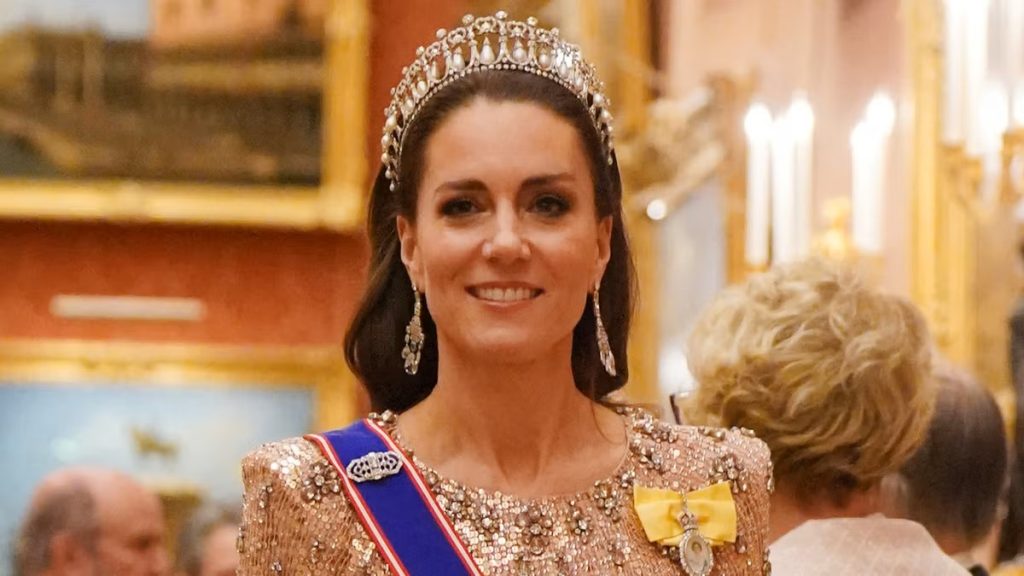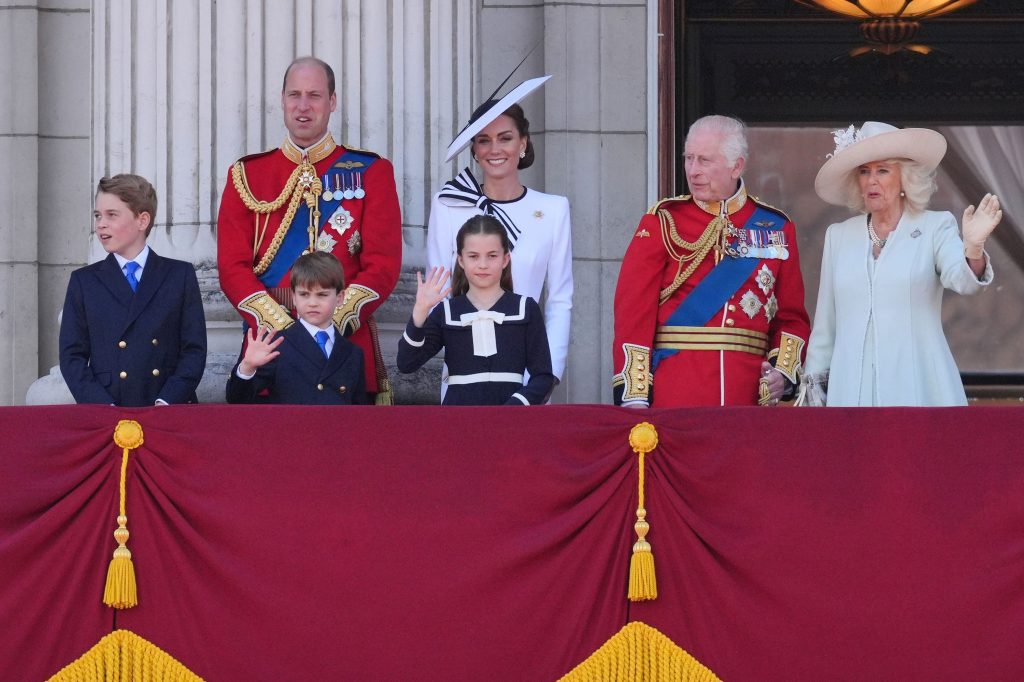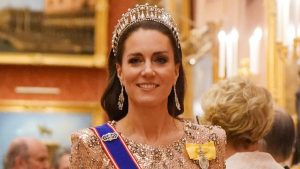
Catherine, Princess of Wales
Royal Duties and Public Image

As Princess of Wales, Catherine is one of the most visible and admired figures in the British monarchy.
She balances tradition with a modern approach to royal service. Her duties include supporting the King and Prince William at state functions. She also champions personal initiatives on mental health, early childhood development, and family well-being. Catherine has taken on patronages of many charities and organizations. This highlights her commitment to causes that resonate with the public. Beyond formal duties, she is known globally for her elegance, dignity, and relatability. Her presence has strengthened the monarchy’s public image in the 21st century. Through her poised demeanor and genuine connection with people, she symbolizes continuity and compassion.
Representing the Crown: National and International Roles
Representing the Crown is a central part of Catherine, Princess of Wales’s royal life. Domestically, she attends state occasions, ceremonies, and community events across the United Kingdom. She inaugurates local projects, meets with charities, and engages with citizens during public walkabouts. Catherine embodies the monarchy’s connection with the British people. Her presence reinforces tradition while conveying accessibility and compassion [1].
Internationally, Catherine plays a key role in diplomacy and cultural representation. Alongside Prince William, she has visited Canada, India, Pakistan, the Caribbean, and the United States. These tours strengthen Britain’s global relationships and promote shared values like education, environmental protection, and cultural exchange [2]. Her elegance, respect for local customs, and warm connection with diverse audiences enhance Britain’s soft power and present a modern, approachable monarchy [3].
Catherine’s dual role as a national figure and international ambassador reflects the evolving expectations of the royal family in the 21st century. She combines dignity with relatability, making her representation of the Crown relevant in a changing world. Through her conduct, she affirms the monarchy’s symbolic role while embracing contemporary values of service, compassion, and diplomacy.
References:
- BBC News. Catherine, Princess of Wales: Royal Duties and Global Engagements. BBC, 2023.
- The Royal Family Official Website. The Princess of Wales: Patronages and Duties. royal.uk, 2024.
- Vogue. How Kate Middleton Shapes the Monarchy’s Global Image. Vogue, 2022.
Patronages and Charities
Patronages and charities are a key part of Catherine, Princess of Wales’s royal responsibilities. They reflect her personal interests and the monarchy’s commitment to public service. Since joining the Royal Family, she has taken on many patronages in health, education, sports, and the arts. She focuses on early childhood development, mental health awareness, and family well-being [1]. These areas are important to her for building a healthier society. Through The Royal Foundation, which she shares with Prince William, she has launched major initiatives. One notable project is the “Heads Together” campaign, aimed at breaking the stigma around mental health [2]
Advocacy Through Key Organizations and Initiatives
Catherine is also a patron of several key organizations, including Action for Children, the National Portrait Gallery, and East Anglia’s Children’s Hospices, where she actively engages with staff and families to provide encouragement and visibility [3]. Beyond formal patronages, she has consistently used her platform to raise awareness of pressing social issues, often combining her charitable visits with public campaigns that draw media and community attention. Her approach blends compassion with long-term vision, aiming not just to support existing organizations but to influence systemic change.
Through her patronages, Catherine has redefined the charitable role of a royal consort for the modern age. She leverages her public profile to amplify the work of charities, ensuring that they reach wider audiences and attract critical support. In doing so, she embodies a model of service that aligns with contemporary values of empathy, advocacy, and practical impact [4].
References:
- The Royal Family Official Website. The Princess of Wales: Patronages and Charitable Work. royal.uk, 2024.
- BBC News. Heads Together Campaign: Breaking the Stigma of Mental Health. BBC, 2023.
- Action for Children. Royal Patronage and Support. actionforchildren.org.uk, 2022.
- Vogue. Kate Middleton and the Modern Face of Royal Charity. Vogue, 2022.
Focus on Early Childhood Development
One of the defining aspects of Catherine, Princess of Wales’s public work has been her sustained focus on early childhood development. Recognizing the first five years of life as critical to shaping future health, happiness, and well-being, Catherine has made this cause central to her royal mission [1]. In 2018, she launched the Royal Foundation Centre for Early Childhood, aimed at driving research, raising awareness, and influencing policy around the importance of early years [2]. Through this initiative, she has supported studies highlighting the long-term impact of early childhood experiences on mental health, education, and social outcomes.
Catherine’s campaigns have consistently emphasized that investing in early years is not only beneficial for individual children but also for society at large. She has spearheaded the “Big 5 Questions on the Under Fives” survey, engaging with over half a million people across the UK to understand public perceptions and priorities regarding early childhood [3]. Additionally, her speeches and public engagements often underline the interconnectedness of parental support, community services, and government policy in shaping children’s lives.
Her advocacy in this field demonstrates a unique blending of royal visibility with practical impact. Rather than focusing solely on ceremonial patronage, Catherine has worked to create a lasting framework for systemic change, ensuring early childhood remains a national priority [4]. This emphasis has helped establish her as not only a patron but also a thought leader in the area of child development.
References:
- The Royal Family Official Website. The Princess of Wales: Early Childhood Work. royal.uk, 2024.
- BBC News. Kate Middleton Launches Centre for Early Childhood. BBC, 2021.
- The Guardian. ‘Big 5 Questions’ Survey Reaches Over Half a Million Respondents. The Guardian, 2020.
- Vogue. Catherine, Princess of Wales, and Her Vision for Early Years. Vogue, 2022.
Advocacy for Mental Health Awareness
Catherine, Princess of Wales, has played a transformative role in breaking the stigma around mental health, making it one of the most important pillars of her royal duties. Alongside Prince William and Prince Harry, she co-founded the “Heads Together” campaign in 2016, which sought to encourage open conversations about mental health and provide greater access to resources for those in need [1]. Through this initiative, Catherine emphasized that mental well-being is just as important as physical health, particularly in the lives of children and young people [2]. Her advocacy extends beyond campaigns, as she frequently visits schools, hospitals, and community centers, engaging directly with individuals to highlight the importance of early intervention and emotional support.
She has also focused on maternal mental health, underlining the challenges faced by mothers during pregnancy and after childbirth [3]. Catherine’s speeches often stress the value of kindness, understanding, and removing social barriers that prevent people from seeking help. In doing so, she has used her public role to amplify the voices of those struggling with mental illness, creating a more compassionate environment for discussions surrounding mental health.
By combining her royal platform with a genuine commitment to change, Catherine has become a leading advocate for mental health awareness in the UK and internationally. Her work has inspired public institutions, policymakers, and charities to reframe how mental health is addressed, ensuring that the topic is no longer marginalized but central to public health discussions [4].
References:
- BBC News. Heads Together Campaign: Royal Family Tackles Mental Health Stigma. BBC, 2016.
- The Royal Family Official Website. The Princess of Wales and Mental Health Advocacy. royal.uk, 2024.
- The Guardian. Kate Middleton Highlights Importance of Maternal Mental Health. The Guardian, 2019.
- Vogue. How Catherine, Princess of Wales, Became a Voice for Mental Health. Vogue, 2021.
Catherine as a Global Style Icon
Catherine, Princess of Wales, has earned international recognition not only for her royal duties but also as a global style icon whose fashion choices resonate far beyond the United Kingdom. From her early appearances as Prince William’s fiancée to her role as Princess of Wales, Catherine has consistently demonstrated a balance between elegance, tradition, and accessibility. She is admired for championing British designers such as Alexander McQueen, Jenny Packham, and Emilia Wickstead, while also wearing affordable high-street brands like Zara and Marks & Spencer [1]. This blend of couture and accessible fashion has made her relatable to the public while strengthening the global profile of British fashion [2].
Her style is often described as timeless and diplomatic. During international tours, Catherine carefully incorporates local designers and cultural motifs into her wardrobe, showcasing respect for host nations while subtly promoting cultural exchange [3]. Fashion experts note that her clothing choices often reflect broader messages of sustainability, as she has been seen repeatedly re-wearing outfits at major events, setting a new precedent within the royal family [4].
Globally, the “Kate Effect” has become a widely acknowledged phenomenon: outfits worn by Catherine frequently sell out within hours, demonstrating her immense influence on consumer behavior and global fashion trends [5]. Beyond glamour, her style projects confidence, professionalism, and warmth—qualities that have reinforced her image as both a modern royal and a relatable public figure. In shaping how royalty can embody tradition while embracing modernity, Catherine has secured her position as one of the most influential style icons of the 21st century [6].
References:
- BBC News. Catherine, Princess of Wales: The Fashion Balance of High Street and Haute Couture. BBC, 2022.
- The Royal Family Official Website. The Princess of Wales: Supporting British Fashion. royal.uk, 2024.
- The Guardian. Kate Middleton’s Diplomatic Wardrobe on Royal Tours. The Guardian, 2018.
- Vogue. Recycling Royal Style: How Catherine Promotes Sustainable Fashion. Vogue, 2021.
- Harper’s Bazaar. The “Kate Effect” and Its Impact on Global Fashion Trends. Harper’s Bazaar, 2020.
- Elle. Kate Middleton: A Modern Royal Style Icon. Elle, 2022.





